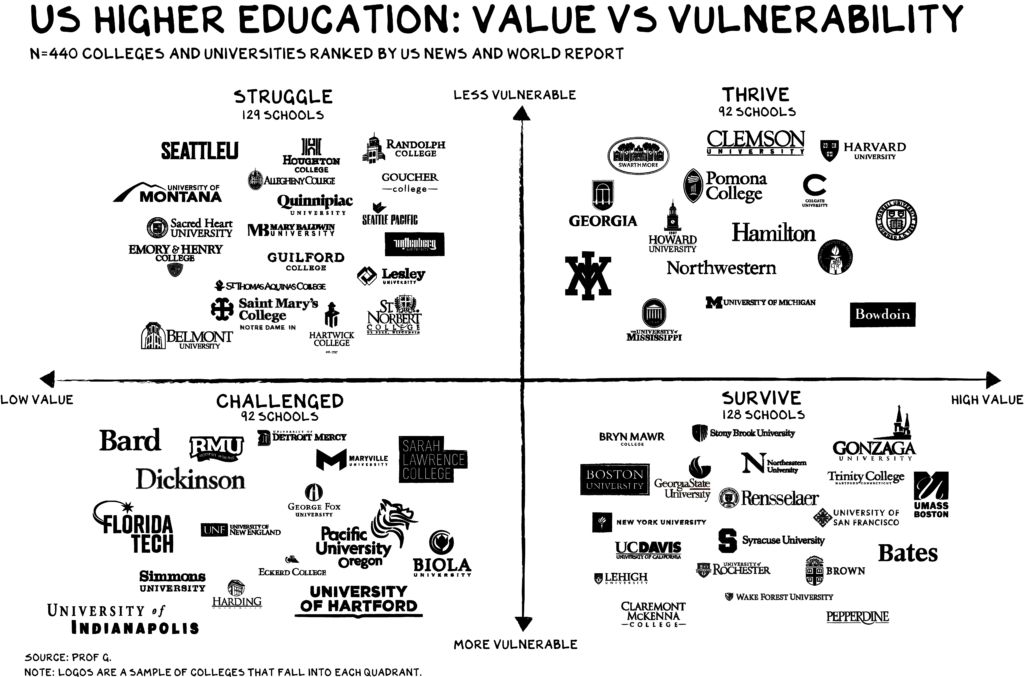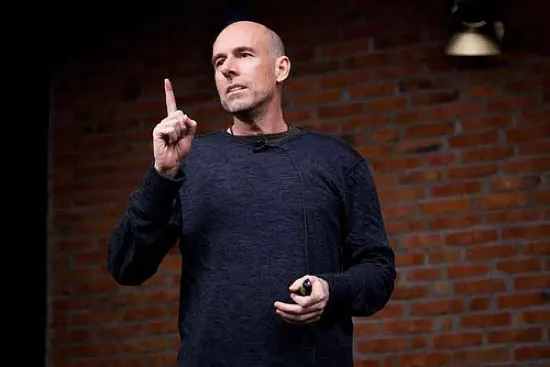
A matrix of universities Galloway predicted with thrive, survive, struggle and perish in the wake of the pandemic from his website, profgalloway.com. The post elicited three cease and desist letters from universities. (Courtesy)
Interesting. What should MBA programs be doing differently, content wise?
In my view, I think the second year (of a traditional MBA) is a ruse. I think the second year is just so we can charge students $140,000 instead of $70,000. I also think that summer internship is kind of stupid. If I were a business school, I’d go 12 months straight, charge half the money, and I’d have four classes: Amazon, Apple, Facebook and Google. I think they should know more about big tech, and I think they should get rid of all this leadership and ethics bullshit.
I think these were courses invented by very arrogant faculty who wanted to teach courses that had absolutely no accountability or measurable outcomes. Courses on diversity and inclusion in what is the most diverse and inclusive place in the world? I get pushback on this, but I think there’s no shortage of universities and academics who love to teach courses where there’s no discernible measurable outcome, because they can’t be held accountable. Teaching finance and cost accounting is hard. When you have a finance department, you get to measure how many people get jobs at finance institutions. When you’re teaching leadership, you know, you talk about Tylenol, and you’re talking about Ken Frazier of Merck, but there’s nothing measurable. But, you know, we’ll take students’ $7,000, and we’ll bring in some formerly important person to teach it.
I think that segues nicely into Section 4, your online business ed platform. (See P&Q’s previous story here.) Tell us about the vision for this venture.
It’s pretty straightforward. We’re trying to offer 60-80% of an elective course for 10% of the price at 1% of the friction. You know, 300 kids will take my class on brand strategy at NYU. When you charge them $7,000 for the class, that $2.1 million in what will largely be debt on young people. I think I can get 60-80% of the content across in three weeks versus 12. We make it an intense format with some offline learning, some online, a lot of synchronous learning because I believe in live lectures.
I think there’s a huge market for people who are just never going to be in a position to leave their families, get a quarter of a million dollars together, and go spend two years at Wharton. The basic offering of a business school is totally sequestered from 99% of the population. If you’re a single mother, you’re not getting an MBA. I think there’s a huge population of people who are saying, “Getting a two-year MBA is just not in the cards for me, but I would like to take a course on supply chain management, or a course on storytelling and communications. I would like to take a course on product planning or innovation. And I want that feel of a Haas School of Business, or NYU or Wharton, but I just can’t pay $7,000. And I just don’t have the skills, the background, the pedigree, or time to apply.”
That’s the consumer value proposition (for Section 4). The proposition to companies is that they’re all looking for ways to create cohorts and shared experiences (for their employees), and taking classes together is a way they do that. So the finance department from Google Brazil will sign up for a Section 4 course, and they will take it together. Our courses are as good or better than anything any one school can string together for one of these executive education courses. A significant number of Section 4 faculty won the Best Professor award at their respective university. Students can take any of those courses over the course of a year and it costs $1,000 through Section 4. We also have this rigorous scholarship process where students send us an email and say, “I can’t afford it,” and they are awarded a scholarship.
So, the basic vision is the following: I’m increasingly uncomfortable with this transfer of wealth from young people to old people, and ground zero for that is universities. I’m a 57-year-old man and, under the auspices of NYU, charging kids $2.1 million to listen to me for three hours for 12 nights. That’s outrageous.
What does the dean of NYU Stern, and other business school deans, think about Section 4 and other disruptors on the market? I find it interesting that it’s an NYU business professor who has launched this kind of platform and who is saying what you’re saying.

NYU’s Scott Galloway was named one of the world’s leading authorities on digital marketing and one of P&Q’s best business school profs in the world in 2012.
Well, NYU has been very supportive. The dean (emeritus) there, Peter Henry, and the President of the university acknowledge the issue. Let me put it this way: They’ve been more supportive of me than I would be of me.
When we first started the company, (other business schools) were fine because they didn’t feel threatened. Then about a year/year and a half ago, they started threatening their professors and saying they can’t work for us–or anyone else online–because, quite frankly, all of a sudden, online is a real threat. That’s kind of the bellwether.
Do you think schools are kind of putting their heads in the sand a little bit, instead of trying to adapt to these changes?
I wouldn’t say their heads are in the sand. They’re smart people. I don’t know if Section 4 (or other platforms) are a nuisance to them or a real credible threat because, the reality is, a certification from Kellogg or Wharton is singular. It’s worth a lot of money. The on-campus experience, the networking, we just don’t provide that. If it’s between taking a Section 4 course or getting an MBA from Wharton, the latter is much more powerful. But one takes two years and a quarter of a million dollars.
We’re just going after an entirely different market. I don’t think anybody’s not applying to Wharton because they’re taking Section 4 courses. What you might have is a company like IBM buy 50 seats for people to take a course in Section 4, and maybe decide not to take 20 people to MIT for exec ed.
Are there any innovations in the MBA, EMBA, or just business education in general that have you excited?
Well, during the pandemic, I taught a full course fully online at NYU. I think (business schools) are getting better at it. But, what is sort of disappointing I think is, for the most part, they’ve all decided that we’re back full time, fully into class.
I think the math they did was, “If we’re online, we’re basically a $60,000 Netflix. So we have to have this kind of Dead Poets Society experience.” I thought they were going to pick up and go hybrid and expand their class size, and I was wrong. The top schools have all doubled down on exclusivity and what I call this rejection of scarcity culture.
Let’s be honest, the only way we can support a $62,000 tuition is if we’re perceived as a luxury brand, and the key to a luxury brand is scarcity. So even if NYU or Wharton or MIT could figure out a way to have a first-year MBA of 5,000 people instead of 500, I think they’ve decided that’s not good for their bottom line.
I think, unfortunately, business schools have decided they’re no longer public servants, they’re Birkin bags. To try and go mass and leverage technology would result in an erosion of perceived scarcity which would hit their margins. What I see as a feature, they see as a bug. I thought they were going to leverage their brands and technology to triple the size of their classes and cut the prices in half and still make more money. And that’s just not what they’re doing.
Not to sound too existential, but it’s a much more dangerous theme in our society, and that is a scarcity economy. Once you own a house, you become NIMBYist and don’t want to allow any other development. Once you’re a big tech firm, you spend a ton of money on lobbying, and acquisitions, and noncompetes to make sure there are no small companies that survive to compete with you. And once you have a degree, you love hearing that schools are now rejecting 90, 92, 94% of applicants. And it’s a great business strategy, but it’s bad for America.
So, if, as you say, we’re hitting the ceiling in terms of price for some mid-tier schools and their MBAs, do you expect to start seeing some lowering of prices, or programs disappearing? When do you think that might occur?
I would think it’d be in the next couple of years. There’s sort of a perfect storm brewing. If you’re a university with low endowments, if you had a lot of international students that have been turned off, you’re ranked 50th, you don’t have a niche, and you’re charging tier one prices? There is no other industry where a Hyundai can charge a Mercedes price. Keep in mind that there are something like 5,500 universities, and 100 are the ones we talk about that get more applications (than spots). The other 5,400 have to go find people. When the economy is strong, I think those guys get whacked.
Let me put it this way: Porsche now makes an SUV, Tide makes pods, and yet we run everything through a four year bachelor’s. I mean, we have not innovated a product at all. What if MIT, CalTech, or Virginia Tech offered a 12- or 18-month intensive program in cybersecurity? There’d be a line out the door of companies who would pay these kids $100,000. But we in the faculty have decided no, they need to take French literature, and we’re going to teach them leadership skills, and they need to go study in Chile.
I don’t think we’ve innovated, but what I see is a lot of schools that get it. The University of California is trying to add the equivalent of a full campus in a huge effort to expand their freshmen roles. I think what’s going on at Purdue is inspiring. Michael Crow at ASU is doing interesting things. So there are innovators.
What I would argue is what’s really needed is sort of a grand bargain with states and their public institutions to say, “We want you to double the seats. We want you to decrease the cost per student by a third. We’ll come up with some more money, your alumni need to come up with some money, and your faculty needs to hold themselves accountable.” I’m hopeful that our public institutions could embrace technology, and we decide we need more freshmen seats and they innovate around more flexible programs. But, so far, I’ve been wrong.
DON’T MISS: ACCEPTANCE RATES AT THE TOP 50 U.S. MBA PROGRAMS + SECTION 4: BUSINESS EDUCATION AT A FRACTION OF THE COST











Questions about this article? Email us or leave a comment below.